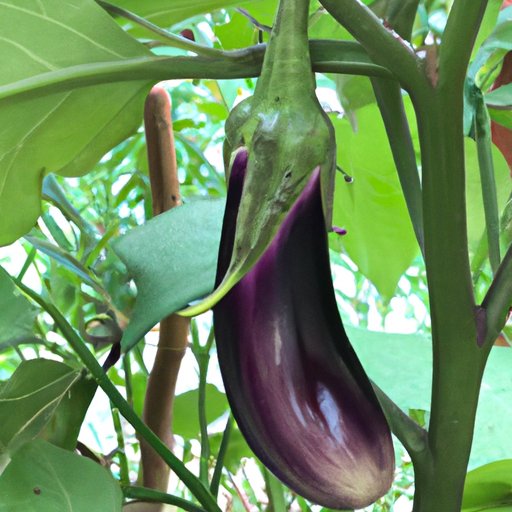
Introduction
Eggplants are a versatile and nutritious vegetable that can be grown easily in a home garden, whether in the ground or in containers. With a few essential tips and techniques, you can successfully grow flavorful eggplants that are perfect for cooking in a variety of dishes. This comprehensive guide will cover everything you need to know to get started with growing eggplants, including selecting the right soil, preventing common problems, harvesting tips, and even cooking ideas.
Beginner’s Guide to Growing Eggplant
Before you begin planting your eggplants, it’s essential to make sure the soil is well-drained and nutrient-rich. You can test your soil by digging a small hole and filling it with water. If the water does not drain within an hour, you may need to amend your soil or choose a different location.
The ideal location for eggplants is in full sun, with at least six hours of direct sunlight each day. Eggplants thrive in warm temperatures, with optimal growth at around 70-85°F.
Eggplants require consistent watering, with at least one inch of water per week. However, overwatering can lead to diseases and other problems, so be careful not to water too frequently.
Fertilization is also crucial for growing healthy eggplants. Choose a slow-release fertilizer with balanced nutrients, or use compost to keep soil rich in nutrients.
Troubleshooting Eggplant Problems
Like all plants, eggplants can face challenges such as fungi, pests, and diseases. Some common issues include leaf spot, powdery mildew, rot, and pests like flea beetles and aphids. To prevent these problems, it’s important to keep your eggplants healthy and stress-free by providing adequate water, nutrients, and sunlight. Also, it is essential to practice crop rotation. If problems arise, you can use organic treatments like neem oil or insecticidal soap instead of synthetic chemicals to prevent damaging the environment.
Harvesting and Cooking Eggplant
Harvesting eggplants is easy when you know what to look for. Ripe eggplants should have a glossy, smooth skin and feel heavy for their size. You can use a sharp knife or pruning shears to cut the stem to avoid damaging the fruit.
Eggplants are versatile and can be cooked in many different ways. From eggplant parmigiana to baba ghanoush, the opportunities are endless. Make sure to properly store eggplants in a cool, dry location.
Organic Eggplant Gardening
Organic gardening practices encourage the use of natural methods of enhancing soil fertility and controlling pests. Some organic techniques you can use for growing eggplants include composting, using natural pest control methods like companion planting or beneficial insect attraction. Also, you can use alternative resources for synthetic chemical fertilizers like bone meal or cottonseed meal.
Growing Eggplants in Containers
Growing eggplants in containers is an excellent option if you live in an urban area or do not have much garden space. The key to successful container gardening is selecting the right container size and type. Eggplants need at least 12-14 inches of soil depth and a container with enough drainage holes. Also, make sure to select well-draining soil, add slow-release fertilizer to boost soil fertility, and water the container regularly.
Conclusion
Whether you’re a beginner or experienced gardener, anyone can successfully grow flavorful eggplants by following a few simple steps. From selecting the right soil to troubleshooting problems to harvesting and cooking, using organic methods and container gardening, there are many ways to make sure your eggplant garden is thriving.




